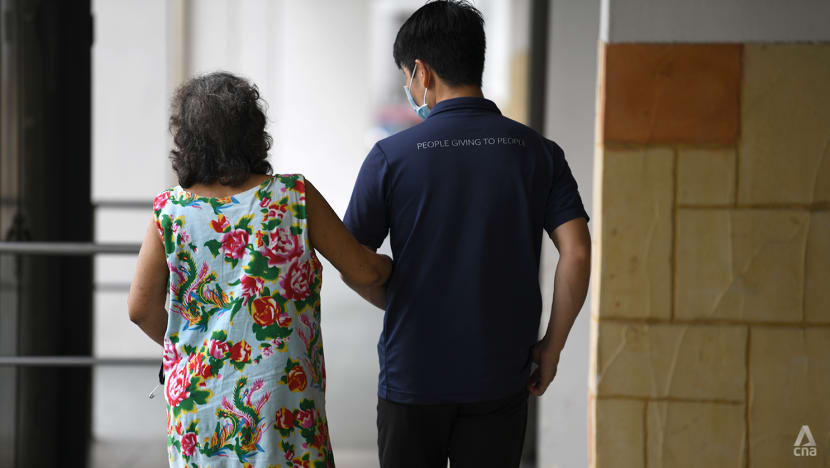Commentary: Caregiver collapse is real and hospitals can smoothen the transition home
As Singapore ages, the burden of caring for those with dementia or other challenging medical conditions will fall on family members, but they too need help, says Tan Tock Seng Hospital (TTSH)'s Assistant Director of Nursing Dr Chan Ee Yuee.

An elderly woman with her caregiver. (File photo: CNA/Calvin Oh)
SINGAPORE: Madam Lim* is a housewife who takes care of her mother. Aside from physical care, she has to deal with managing her mother's dementia, hallucinations and behavioural changes. All these keep Madam Lim up at night.
"She screams and wakes everybody up. I lost 7kg within one month. I'm very stressed and tired. I cannot eat or sleep," Madam Lim confided to nurses from Tan Tock Seng Hospital (TTSH) Carer Matters.
Caregiver stress has been discussed several times before. President Halimah Yacob weighed in last October when she rightly pointed out how many are "on call', almost all day", speaking at the 28th Exemplary Mother Award presentation ceremony.
The pandemic has greatly intensified the plight of caregivers. As tightened restrictions exacerbated feelings of loneliness and isolation amongst seniors confined at home, caregivers too experienced heightened stress, having to provide constant care for their loved ones.
Such intense stress, if unaddressed, can spiral out of control and result in "carer collapse". Without adequate support or respite, the collapse of these carers often leads to the placement of their loved ones in nursing homes, which in itself has long waiting times and cost considerations.
An earlier study conducted by TTSH nurse researchers found that most caregivers are middle-aged, with 71 per cent of caregivers being the adult children of the elderly. The vast majority (85 per cent) lived together with the loved one, with many caregivers reporting that they spent "most of their waking hours" doing or thinking about caregiving-related activities.
With few or no family members for support or having varying difficulties in employing domestic helpers to offload the caregiving burden, many feel consumed by a never-ending barrage of caregiving responsibilities - 24/7 caregiving - with undesirable consequences.
Many had to put on hold their other responsibilities due to the disruption of respite services if a household member developed COVID-19. Some had to shoulder the responsibility themselves when their other family members or domestic helpers were ill with COVID-19, fearing the possibility that their aged loved one could catch COVID-19.
One example of this was Ms Oh*, whose domestic helper tested positive for COVID-19. Living alone with her frail mother and the domestic helper, she struggled with the twin efforts of delivering care for her mother and seeking isolation options for her helper.
'24/7' CAREGIVING: A RELENTLESS, ALL-CONSUMING & INSIDIOUS AFFAIR
What sort of struggles do such 24/7 caregivers face?
The first is a constant and heightened state of anxiety. Mrs Tan*, the main caregiver of her husband, who has dementia, is a typical example. She always felt the need to constantly keep a watchful eye over her husband and felt trapped in a constant state of hypervigilance to ensure his safety.
"You don't even have the time to be alone, just to have your own thoughts. You got to reschedule your whole life (around caregiving)," said Mrs Tan.
Caregiving takes on a relentless and all-consuming nature where it gradually becomes the central - and often sole - facet of their identity. These 24/7 caregivers typically have every moment of their lives revolving around their care recipients, leaving little time for self-care or respite.
The second impact of 24/7 care is the mental toll it takes. Mr Lee*, a 55-year old man who became a full-time caregiver, found his father displaying personality changes like major mood swings of anxiety and disorientation.
It was hard to deal with his father's deteriorating physical and mental condition, which made his own mental health worse. "There's mental torture that caused a lot of stress. Imagine you cannot sleep properly every night. It's like during wartime, and the soldiers have to be alert", Mr Lee told our team, drawing parallels between caregiving stress and wartime experience.
HOSPITALS HELPING IN THE JOURNEY HOME
Despite the important role caregivers play in supporting the recovery of their loved ones, support for their challenges remains inadequate. Family caregivers must learn to manage the changing needs of their loved ones, actively seek out health information and support services, and navigate social and healthcare systems.
While there is a growing recognition of caregiving stress and caregivers' needs, accessibility to support structures remains a challenge and proactive outreach to caregivers is critically needed.
This could start at the hospital – a place when an elderly person is admitted for a medical issue and subsequently discharged with higher care needs. Post-discharge, the caregiver may have to manage the continuing care of the patient with the use of new devices such as feeding the patient through the nasogastric feeding tubes or providing further assistance to the patient in post-surgery recovery.
The hospital-to-home transition is a prime opportunity to better equip and engage caregivers.
Hence, TTSH Nursing started Carer Matters, a program introduced to support caregivers holistically as their loved one is discharged.
Carer Matters has been piloted in selected inpatient wards since November 2019, after previous research found that one in three caregivers were at risk of depression, anxiety, and a poor quality of life.
Caregivers of hospitalised patients in distress are referred to the Carer Matters team, where nurses would conduct an assessment of caregiver needs, provide educational programmes and tailored resources, assist in finding support services and grants, and offer emotional support over the phone.
Carer Matters has helped more than 600 caregivers, helping them navigate the care journey back home. These programmes helped prepare caregivers for their current and future care needs and enhanced their skills knowledge on better managing their loved one's emotional and behavioural issues.
Newer caregivers say they found these initiatives "very useful" as they learnt "what (they) can prepare for, what (they) can expect on the caregiving journey, and what kind of help (they) can receive".
NO ONE SHOULD BE LEFT TO STRUGGLE ALONE
Overcoming 24/7 caregiving challenges requires a multifaceted approach. Along with supportive government policies and community initiatives, hospital staff and healthcare providers play a crucial role in supporting caregivers as they serve as a key touchpoint for engagement, preparing them for their roles and responsibilities of care at home.
Many seniors aspire to age gracefully in place at home and be well and comfortable throughout their twilight years, surrounded by their loved ones.
It is natural for caregivers to desire the same for their aged loved ones. More can be done to help ensure they are not sucked into the whirlpool of 24/7 care, resulting in potential carer collapse. One approach is by helping them identify resources and people they can call on.
For many caregivers like Mrs Tan, learning how to rally extended familial support to keep her husband engaged in activities has helped her carve out personal space for respite and self-care. "At least I managed to get half an hour or so just to have my own thoughts," says Mrs Tan.
Carer Matters also helps connect caregivers to the wider community of care. This is achieved by facilitating caregivers' applications for assistance, coordinating with community and clinical partners to ensure the smooth passage of the application.
Upon learning of Ms Oh's predicament, nurses from Carer Matters walked her through home-based safe measurement methods and options for suitable care arrangements until Ms Oh was able to have her helper safely isolated when she was having COVID-19. This helped lower the stresses that Ms Oh was experiencing.
Indeed, through the delivery of personalised support and resources, more initiatives such as TTSH Carer Matters can continue to contribute to caregiver burden alleviation by empowering 24/7 caregivers to better care for themselves and their loved ones in a sustainable manner.
Caregiving can be a rewarding, empowering and sustainable journey with the right tools and support.
Dr Chan Ee Yuee is the head of the Nursing Research Unit at Tan Tock Seng Hospital and the lead of Carer Matters, supported by the Ng Teng Fong Healthcare Innovation Programme's Community Enabling Fund. She is also an Adjunct Assistant Professor at NUS Alice Lee Centre for Nursing Studies.
*Pseudonyms have been used in this commentary.





















